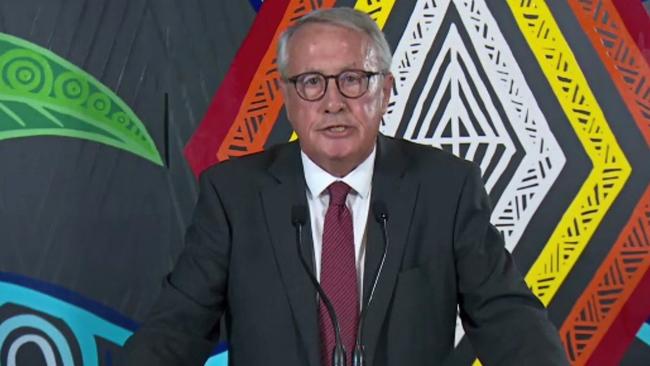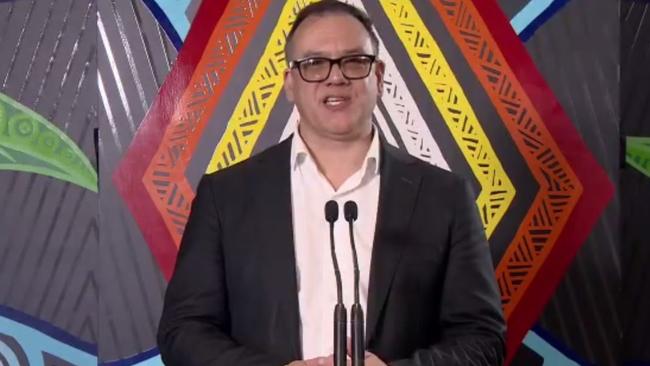Wayne Swan apologises for payout delay scandal at Cbus AGM
Wayne Swan has apologised ‘unreservedly’ for the excessive delay in paying millions of dollars to grieving families in an extraordinary address to the super giant’s annual meeting.

Cbus chairman Wayne Swan has apologised “unreservedly” for the excessive delay in paying millions in payments to grieving families and disabled people in an extraordinary address to the $94bn superannuation giant’s annual meeting.
As he faces questioning in parliament on Friday over the 10,000 Cbus members and claimants whose death and disability insurance claims were delayed for 12 months or more, Mr Swan apologised for the fund’s latest scandal but stood by a raft of new board members sourced from the controversial CFMEU.
Mr Swan – who is also Labor’s national president – told the annual general meeting that the fund was “uplifting” its customer service efforts and said it had worked through 80 per cent of outstanding claims.
“Last year, the fund reported to this meeting on delays to our insurance claims handling and the steps taken to remediate and compensate affected members,” Mr Swan told its annual general meeting on Thursday night.
“Once again, I want to apologise unreservedly to the members and families impacted by these delays … and to members of the fund as a whole.”
The apology was Mr Swan’s strongest statement yet on the death payments saga. On Friday, he will appear in front of the Senate economics committee, despite initially rebuffing demands from the upper house to front up on the allegations facing Cbus.
At its online-only AGM, the fund rolled out a selection of pre-selected questions from members mostly around investment performance and elementary queries on how superannuation works: There were only a handful of questions on the scandal surrounding delays to insurance payments.

The super giant has been drawn into a deepening crisis after the Australian Securities & Investments Commission launched legal action against the fund earlier in November, alleging delayed payments of $20m worth of death and disability benefits. ASIC alleged that Cbus did not take appropriate action when it was warned about the massive failures – covering up to 10,000 claims – and that people to this day may be waiting for payouts. Cbus has deflected some of the blame on Link Administration Group, which handles its insurance claims.
Asked if the superannuation giant would bring its troubled insurance processing operation in house, Cbus chief member officer Marianne Walker said: “Given the failure of Link … we are examining all options. We can’t make these changes overnight but it’s a high priority.”
Cbus is also facing two parallel investigations from the Australian Prudential Regulation Authority in relation to “questionable expenses: and issues relating to the appointment of new directors and their links to the CFMEU.
The fund did not deal with any questions on board membership even though Cbus has also faced specific criticism issues from financial analysts over its board composition.
Instead Mr Swan welcomed the new board members “wealth of experience”, adding that the fund was co-operating with the regulator APRA on board issues.
Among the new board members is Paddy Crumlin.
During his tenure at the Maritime Union of Australia, the union’s Maritime Super was listed as one of the poorest performing default funds in the local market.
Only weeks ago the global rating group Morningstar downgraded its parent view of Cbus from average to below average.
The agency included the political crossover inside the fund as a key issue, suggesting its “concern extends to the appropriateness of union affiliates sitting on Cbus investment committees.”
Asked at the AGM what Cbus would do to “clean up its act”, chief executive Kristian Fok said the fund is co-operating with regulators and working hard to address the delays.
Asked if the fund had fallen behind some other funds over the last year, chief investment officer Brett Chatfield added that the group had a higher than average exposure to the property sector, but believed the fund was well positioned long term.
As an investment fund, Cbus has managed a solid performance with a 10-year average return of 8.5 per cent which is on par with its peers in Big Super.
Cbus is only the most high-profile problem case inside industry super:
There has been a cocktail of recent failings inside big super covering everything from tech failures to unlisted valuations at funds as diverse as ART, Australian Super, Hesta and Unisuper.
All of Cbus’s alleged failures occurred under Mr Swan’s watch, leading to questions about how the former federal treasurer and mentor of Jim Chalmers allowed the scandal to occur.
Despite concern over how the matter would be weaponised by the Coalition, Labor MPs said the scandal did not necessitate Mr Swan standing down as the party’s president, a role he has held since 2018.
The charges are another headache for the multibillion-dollar super fund, which has already been dogged for months over its links to the Construction Forestry and Maritime Employees Union and its ousted militant leadership.







To join the conversation, please log in. Don't have an account? Register
Join the conversation, you are commenting as Logout